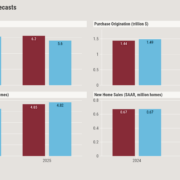DataDigest: Fannie Mae’s market view gets rosier, but traders get more skeptical
Last month, DataDigest explored market experts’ expectations for 2024, with the consensus calling for a moderately better housing market than 2023.
But a meeting of the Federal Open Market Committee the following week set off a market frenzy over expectations of interest rate cuts, moving mortgage rates down well ahead of experts’ forecasts and prompting a subsequent DataDigest that asked whether the picture for 2024 had changed.
On Jan. 18, Fannie Mae weighed in: yes.
Fannie Mae’s latest monthly forecast for the housing market predicts much lower mortgage rates than its December forecast — and thus more home sales and mortgage originations.
Mortgage rates, which dropped precipitously the week of the FOMC meeting, are key to Fannie Mae’s rosier view of the road ahead in 2024. Fannie Mae’s quarterly rate forecasts this month were far lower than last month’s and were its lowest forecasts in at least six months.
“Following the Fed ‘pivot’ in December, an anticipation of more dovish policy, and the recent decline in interest rates, our mortgage rate forecast has been revised meaningfully lower this month,” Fannie Mae wrote in its forecast release.
Mortgage rates have hovered around 6.7% — Fannie Mae’s December forecast for 2024’s average — since mid-December, and the company’s forecast for 2024’s average is now 6.1% with rates dropping below 6% by year end. This should prompt a “gradual recovery” in home sales and single-family mortgage origination, according to Fannie Mae Senior Vice President and Chief Economist Doug Duncan.
“Inflation’s decline and the resultant Fed pivot to signaling future rate cuts lead us to believe that home sales and mortgage originations likely bottomed out in the second half of 2023 and that a gradual improvement is now underway,” he said in a statement.
“We expect mortgage rates to dip below 6 percent by year-end 2024 and for homebuilders to continue to add new supply, both of which should aid affordability. Additionally, the decline in mortgage rates is likely to push refinancing volumes upward, along with some pickup in purchase financing.”
The company’s quarterly forecasts for existing and new homes are up significantly from its forecasts from recent months.
Its forecasts for single-family purchase and refinance originations are also above its recent forecasts, although not as dramatically higher as with home sales.
Although Fannie Mae’s outlook for 2024 is up, Duncan warned against getting too carried away.
“However, even at less than 6 percent, we think rates will still have a significant way to go in order to meaningfully reduce the ‘lock-in effect’ experienced by homeowners who refinanced or bought during the pandemic,” he said.
Traders disagree
The yield on 10-year U.S. Treasury notes — a major factor in setting mortgage rates — opened December at 4.2%. On the heels of mid-month FOMC meeting, the rate fell to a low of 3.8% on Dec. 27.
That drop has been completely erased already in 2024, with the latest rate above 4.1%.
The steep rebound was fueled in part by comments Federal Reserve Governor Christopher Waller made at a virtual event hosted by the Brookings Institution on Jan. 16. Waller said rates should be cut “methodically and carefully” and added, “I see no reason to move as quickly or cut as rapidly as in the past.”
Equity traders, too, have been skittish regarding interest-rate-sensitive stocks — the same stocks that fueled a late December stock market rally. Traders sold off stocks of real estate investment trusts and speculative tech companies last week, but share prices have rebounded so far this week.
The pullbacks signal bond and equity traders are becoming less optimistic about a March rate cut. We’ll have to wait until February’s forecast to see if Fannie Mae’s optimism holds or if traders’ skepticism spreads.




 :215-447-7209
:215-447-7209 : deals(at)frankbuysphilly.com
: deals(at)frankbuysphilly.com
